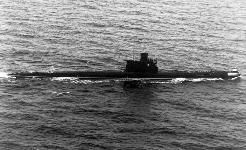
|
|
SUBSIM: The Web's #1 resource for all submarine & naval simulations since 1997
 |
SUBSIM: The Web's #1 resource for all submarine & naval simulations since 1997 |
|
|
 06-16-08, 08:32 AM
06-16-08, 08:32 AM
|
#1 |
|
Pacific Aces Dev Team
 |
Thanks Catfish.
I take it there isn't ( as yet) an english translation of the book so I can't comment on its views. If your review accurately represents the book then all I can say is OK its a point of view. I would certainly agree that WW1 wasn't such a clear case of "baddies v goodies" as ww2 has become, but I would still take some persuading that a somewhat neurotic head of state presiding over an autocratic system of government didn't destabalise europe into a major war.
__________________
"You need to put your behind in the past". Kumba |

|

|
 06-18-08, 11:45 AM
06-18-08, 11:45 AM
|
#2 |
|
Dipped Squirrel Operative
|
Hello,
Horsa thanks fo your comment, i believe all this this is probably hard to accept. I have already posted some more parts of a "review" over at the aerodrome forum, if anyone is interested: http://www.theaerodrome.com/forum/bo...-new-book.html The contents of the book maybe highly controversial, but it is well worth a read. Schroeder does not really describe his point of view, but mostly quotes correspondence and witness reports that paint a different picture about WW1 than i thought i knew. I am almost thinking of translating the whole thing, but 400+ pages ... Thanks and greetings, Catfish |

|

|
 06-18-08, 01:14 PM
06-18-08, 01:14 PM
|
#3 | |
|
Pacific Aces Dev Team
 |
Quote:

__________________
"You need to put your behind in the past". Kumba |
|

|

|
 06-24-08, 09:34 AM
06-24-08, 09:34 AM
|
#4 |
|
Commander
 Join Date: Sep 2006
Posts: 462
Downloads: 2
Uploads: 0
|
[off-topic]AAH I've read Hilter's U boat war a year ago, when I borrowed it from a public library. Quite a good book and it's pretty informative
 [/off-topic] [/off-topic]No surprise that U boat captains use desk guns to sink targets - the torpedoes lack enough explosive charge (warhead is half of that in WWII while enemy ship size is similiar), the shortage of torpedo supply which means torpedoes had to be saved for large targets, means desk guns are necessary to sink ships, and that's why British could employ Q-ship successfully. Without luring a Captain to surface the boat and uses his gun, any hidden guns won't work
__________________
Romeo is here, but where is Juliet?  The 中国水兵 (Chinese Sailor) in subsim |

|

|
 06-29-08, 06:06 AM
06-29-08, 06:06 AM
|
#5 |
|
Dipped Squirrel Operative
|
Hello,
apart from the not-so-effective torpedoes (the book mentions that a half of them missed the target, and some did not explode, if only a few) there is another point regarding the law of nations (or international public law), and war crimes. Through a periscope it was not easy to decide whether the target was a neutral, an enemy or a Q-ship. Since german U-boat commanders were instructed to thoroughly examine what kind of ship it was before an attack, this was a time consuming and dangerous task. The larger boats were fast enough and could stop any but very fast ships with the deck gun. The boats of the Flanders flotilla were slow and had no deck gun, so they could not stop or outrun an enemy - they were to sink obviously hostile ships submerged, identified only by periscope. Prize regulation according international public law : - Enemy warships: These were allowed to be attacked without warning anywhere but in neutral harbours. - Enemy trade ships (merchants): Allowed to be sunk anywhere with regard to international public law, the so-called prize regulation treaty. -Neutral ships - they had to be stopped, searched, and its papers controlled, and only if the ship had contraband, weapons or whatever on board it was allowed to sink them. Again the crew was allowed to leave the ship. The exception to this generally accepted practice was the unrestricted, or "total" war, as it was termed by England, which seems to have fought this kind of war since the beginning. Trade ships were sunk without warning, even in neutral harbours, together with designated hospital ships. The US protested against this kind of warfare, but to no avail. Germany limited the unrestricted U-boat war to certain regions around England, but even then most U-boat crews again stopped the ships and let the crew leave before sinking it against the declared will of the Reichsmarineamt (Reichs Naval Office). Again this "unrestricted war" did only take place for a short time, and it was not so unrestricted, since there were hundreds of exceptions and regions where sinkings were not allowed. The "Q-ships" were a u-boat trap in a double sense - if a boat remained at the surface because its course was crossing an "american" or other neutral ship that suddenly opened fire, it was mostly sunk within minutes. If a boat would have sunk an american ship suspecting it was a "Q-ship" there would be instantly an international uproar, probably drawing the US into the war. The Baralong Q-ship incident was one of those atrocities witnessed by american passengers, but it was then played down by the Entente propaganda. Anyway all "Q-ships" did not have the impact that had been intended, and despite using them, the german U-boats still followed international prize regulations - indeed the tonnage sunk per month was even bigger than during the months of the unrestricted U-boat war. Greetings, Catfish |

|

|
 |
| Thread Tools | |
| Display Modes | |
|
|
